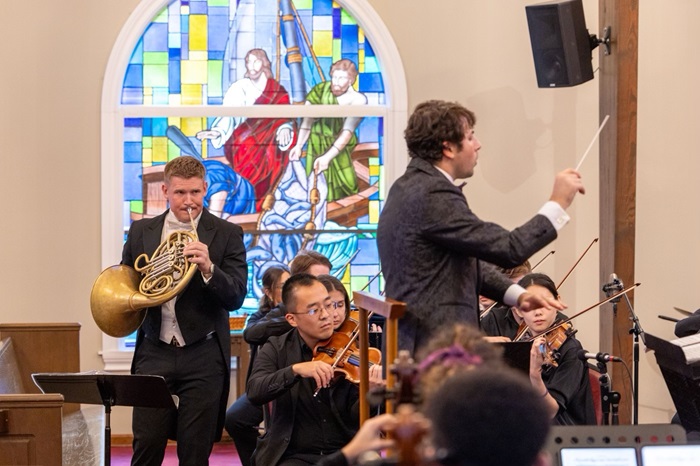Great Falls Philharmonic marks first year as new orchestra on the block

Emerson Miller was soloist in Richard Strauss’s Horn Concerto No. 2 Sunday evening, with the Great Falls Philharmonic under conductor Derek Maseloff. Photo: Daniel Rosenbaum
A new regional orchestra has joined the local scene. Founded in 2023, the Great Falls Philharmonic celebrated its first anniversary Sunday evening, with a pleasantly surprising concert honoring Czech music at Christ the King Lutheran Church in Great Falls. The ensemble’s founder and artistic director, Derek Maseloff, also serves as the church’s director of music.
The players are young professionals from around the Washington area, and they performed this diverting program with verve and polish. First came a world premiere, a concert overture by Czech composer Sylvie Bodorová, on themes drawn from her recent opera Quo Vadis, based on the 1895 novel of the same name by Henryk Sienkiewicz. The opening of the piece put the spotlight on the orchestra’s strength, its horn and trombone sections, who played with ferocious power, providing most of the piece’s attractive moments.
Bodorová’s musical style remains solidly tonal, and she made some obvious choices in characterizing the different forces in the story. A Gregorian chant melody (Kyrie XI “Orbis factor”), played somewhat austerely, represented the Christians, with more dissonant music representing their Roman oppressors. A Middle Eastern-tinged dance melody, complete with tambourine jingles on offbeats, would not have been out of place in a Hollywood religious epic.
Matters improved when the orchestra’s lead horn player, Emerson Miller, stepped in front of his colleagues to take the solo part in Richard Strauss’s Horn Concerto No. 2. Dedicated to the memory of the composer’s father, who was principal horn player of the Bavarian Court Opera in Munich, the piece makes serious demands on the soloist. Miller, a staff sergeant in the U.S. Army Ceremonial Band, played the work with calm bravura. (Maseloff, who is himself a horn player, acknowledged that taking on the piece was aiming high for this young ensemble.)
Maseloff conducted with restraint, his baton arm mostly mirrored by his cue arm, content most of the time not to micromanage. The musicians responded with a sense of warm collegiality and dedication, cohering as an ensemble with remarkable confidence. With the Strauss score’s smaller brass section, more attention fell to the strings, who were a little underpowered in terms of numbers in the orchestral tutti sections in the first movement, especially the valiant section of just four violists.
The concerto’s heart, the poignant slow movement, featured some plaintive woodwind solos, especially in oboe and bassoon, but the central section in D major needed a greater warmth that the small number of players could not quite provide. Miller’s range-spanning acrobatics in the bouncy finale featured athletic accuracy for the most part, while Maseloff’s sometimes hazy beat made for a few dicey ensemble moments as the ensemble unity became less secure.
The church’s sanctuary is not a large space, and the larger instrumentation of Dvořák’s Eighth Symphony, like the opening Overture, sometimes overpowered the room. The opening of the first movement feels like a slow introduction, but Dvořák kept the same Allegro con brio tempo throughout, just moving from longer rhythmic values to shorter ones in the main theme. Maseloff took romantic liberties with the soulful minor-key opening, part of an overall approach that yielded a sense of musical spontaneity.
Although the orchestra played at an admirably high level for a group with such a brief history together, there were some minor shortcomings. The flutes and trumpets proved not always reliable, and the violins tended toward intonation issues at the top of their range in exposed places. Once again, the horns and trombones impressed most, in the rumbling evocation of a thunderstorm in the pastoral second movement.
Maseloff’s tempo choices largely convinced, especially the relaxed character of the compact third movement, with its rhythms reminiscent of folk dances. The cello section, led by principal Katie McCarthy, smoldered in the main theme of the fourth-movement variations. With well-drilled precision, Maseloff led his young orchestra to an adrenaline-fueled climax of the finale, rounding out the feeling that this group’s advent is a welcome addition to the area’s musical life.
The Great Falls Philharmonic performs music by Jessie Montgomery, Emmanuel Sejourné, and Tchaikovsky 3 p.m. November 3. gfphil.org
